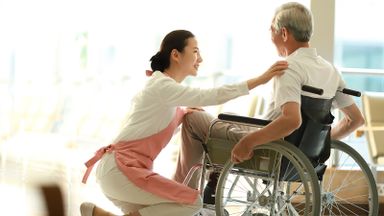How to Care for Elders During the Coronavirus Crisis

With adults over 65 most vulnerable to contracting COVID-19, our shared concerns for the physical and emotional well-being of our parents, grandparents and elderly neighbors are stronger than ever.
But there are plenty of opportunities to help them out, from easing the burden of daily responsibilities to finding unique ways of spreading cheer in our community. Here are four ways we can safely make life a bit easier as we care for elders during the coronavirus crisis.
PROVIDE ESSENTIAL SERVICES
Start by identifying the elderly person’s basic needs, says Farron Blanc, CEO and co-founder of Gerry, a concierge service that helps families find long-term elder care facilities.
“It is especially helpful, particularly during times of crisis, for older adults to receive support taking care of essential tasks,” he adds. “Delivering food is great, but many older adults may also need help with paying bills and things like calling utility companies as needed.”
It's easy to ask your elderly parents what they need. But if you are trying to assist a friend or neighbor, consider leaving a note where they can find it or sending an email with your contact information with an offer to help. Picking up medication and running other essential errands can be especially helpful for those who are at the biggest risk but try to think outside the box as well. Could you care for their pet in your home? Help facilitate a telemedicine appointment? Take out the trash? Take stock of your own weekly needs and offer help in areas they may not have considered.
ORGANIZE A SCHEDULE
While social distancing has made it a challenge to stay connected, there are wonderful ways to keep in touch, including videoconferences, phone calls and scheduled drive-by visits. Blanc says that many of the elder care facilities he works with are combating isolation by organizing front-door visits where “family and friends are invited at a scheduled time to stand outside a facility to exchange messages and waves with a loved one.”
Schedules can provide elders with structure and give them something to look forward to. Set up a rotation of phone calls and check-ins from extended family to keep the volume of interaction consistent.
MAKE SURE THEIR SENIOR-LIVING FACILITY HAS COVID-19 PROTOCOLS
Now more than ever, safety is paramount. Get to know the infectious disease practices of your loved one’s senior-living facility.
“Policies vary widely by community,” Blanc says. “Make sure you are aware of everything from how often facilities are cleaned to what procedures are already in place in the event of an outbreak or lockdown.” For instance, some places may stagger mealtimes and have residents dine six feet apart; others make sure staff change their gloves regularly throughout a shift.
If the policies at your loved one’s facility seem less than rigorous or are not clearly defined, follow up and demand more — or consider making new arrangements.
WATCH FOR SCAMS ON THE ELDERLY
In addition to their physical and emotional needs, older people’s financial safety may need protecting. In no time, scammers have popped up to prey on people's common fears about the coronavirus. The elderly may be especially susceptible to these tactics, so it’s important to calmly make them aware of how to spot fraud.
Common scams include claims for treatments or test kits for the virus (they are not publicly available yet) and donation solicitations to COVID-19-related nonprofit organizations that don’t exist. Help them create a list of organizations they might want to help — but only after vetting their authenticity with you.
Remind your loved ones to be wary of any strangers seeking out their attention, money or personal information, which is most likely to happen online. Along with the global uptick in internet usage, reports of cyber-security fraud have spiked. Encourage your older family and friends not to click on suspicious links or open emails from people they don’t recognize.
Feel better about taking action on your dreams.
Your advisor will get to know what’s important to you now and years from now. They can help you personalize a comprehensive plan that gives you the confidence that you’re taking the right steps.
Find your advisor




